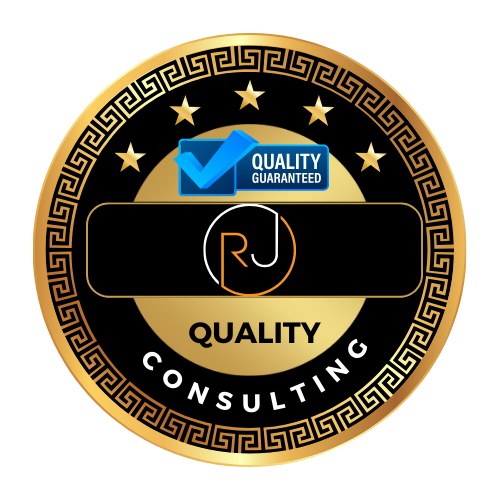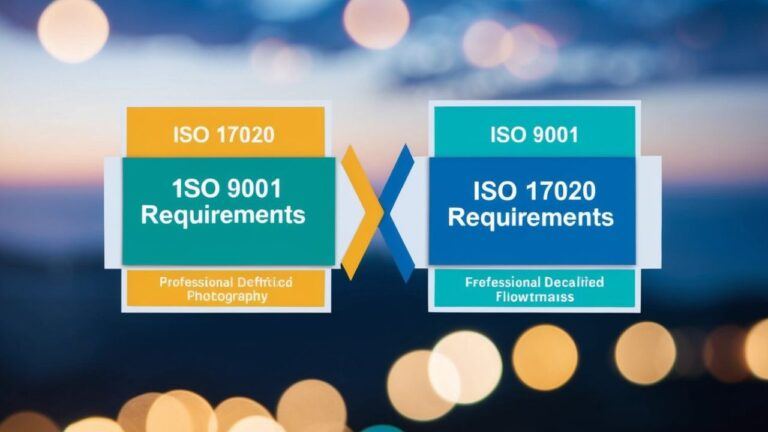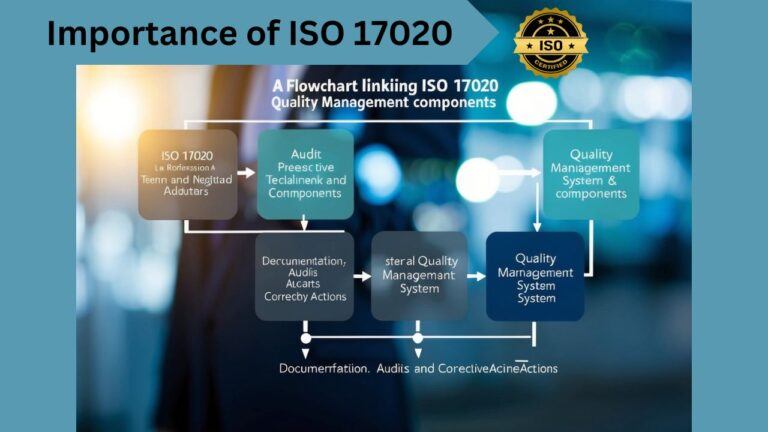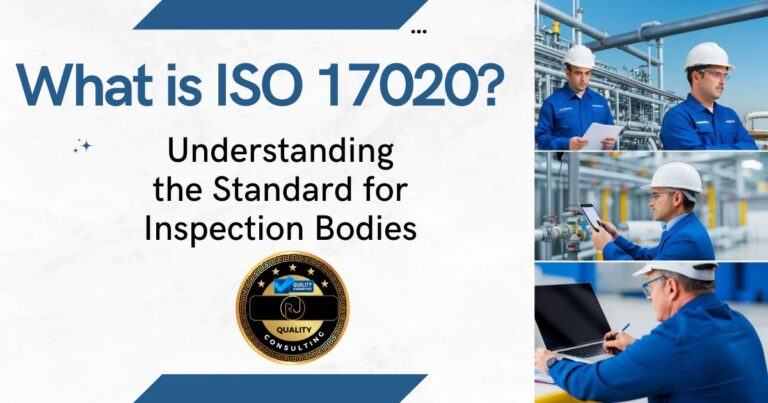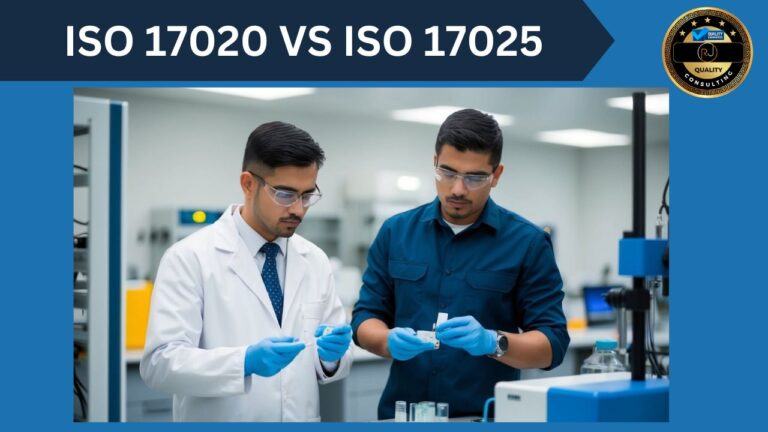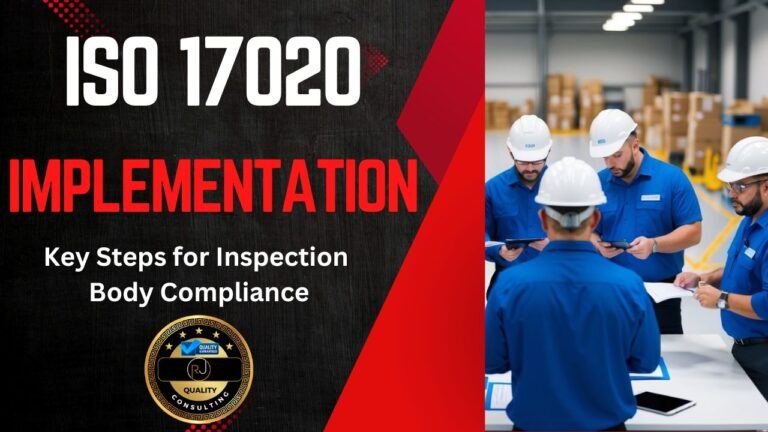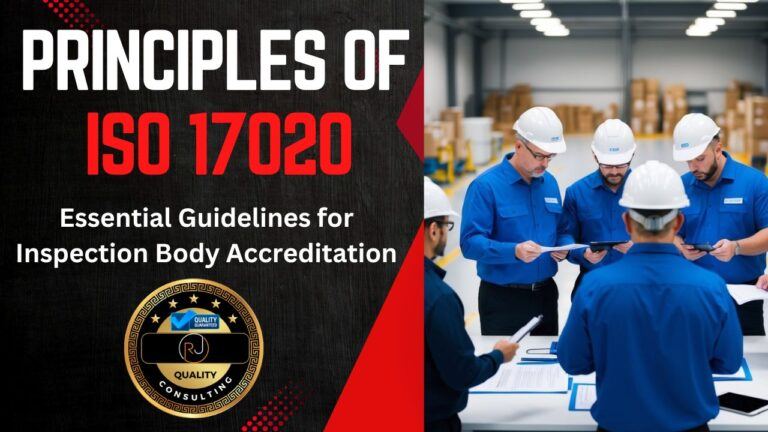Benefits of ISO 17020: Enhancing Inspection Body Credibility and Competence
ISO 17020 helps inspection bodies work better and gain trust. It sets rules for how they should do their job. The standard makes sure inspections are done right and fairly. In this post, we will explore the benefits of ISO 17020 and what it can do for your inspection organization.

ISO 17020 accreditation can boost your business and open new doors. It shows clients you meet high standards. This can lead to more work and better pay. You’ll also learn how to run your inspection body more smoothly.
Getting ISO 17020 certified takes work, but it’s worth it. You’ll need to set up good systems and train your staff well. But once you’re certified, you’ll stand out from other inspection bodies. Clients will know they can count on your work.
Key Takeaways
- ISO 17020 sets rules for inspection bodies to ensure quality and fairness
- Accreditation can lead to more business and better operations
- Certified inspection bodies gain trust and stand out in the market
Understanding ISO/IEC 17020

The key to understanding ISO 17020 is to unlock the answer to the question, what is ISO 17020? The first thing I recommend is to obtain a copy of the ISO/IEC 17020:2012 standard. ISO/IEC 17020 sets rules for inspection bodies. It helps ensure their work is consistent and reliable. The standard covers different types of inspection bodies and their services.
History and Overview of ISO/IEC 17020
ISO/IEC 17020 first came out in 1998. It was updated in 2012. The standard gives rules for how inspection bodies should work. It applies to many fields like food safety, construction, and product testing.
The standard focuses on being fair and consistent. It tells inspection bodies how to manage their work. This includes how to handle staff, equipment, and reports.
ISO/IEC 17020 is used worldwide. Many countries recognize it as a key standard for inspections. It helps make sure inspections are done the same way everywhere.
The Importance of Inspection Bodies and Services
Inspection bodies play a big role in many industries. They check if products, services, or processes meet certain rules or standards. This helps keep things safe and working well.
Their work protects consumers and businesses. For example, they might check if a building is safe or if food is okay to eat. This helps prevent accidents and health issues.
Inspection services also support trade. They make sure products meet the right standards to be sold. This is key for businesses working in different countries.
By following ISO/IEC 17020, inspection bodies show they can be trusted. This makes their reports more valuable to clients and regulators.
Types of Inspection Bodies: Type A, B, and C
ISO/IEC 17020 defines three types of inspection bodies: A, B, and C. Each type has different rules about how separate they must be from what they inspect.
Type A bodies are the most independent. They don’t design, make, sell, or fix what they inspect. They only do inspections. This makes them very impartial.
Type B bodies are part of a larger organization. They only inspect things for their own organization. For example, a car company’s quality control team.
Type C bodies can do inspections for their own organization and others. They have some safeguards to stay fair, but they’re not as independent as Type A.
The type of body you choose depends on your needs. Type A is best for the highest level of independence. Types B and C can be good for internal checks or specific industry needs.
Quality and Competence in Inspections

ISO 17020 helps inspection bodies deliver high-quality services. It sets standards for technical skills, quality systems, and reliable reporting.
Ensuring Technical Competence
You need skilled inspectors to get accurate results. ISO 17020 requires staff to have the right knowledge and experience. This means:
- Proper training programs
- Regular skill assessments
- Up-to-date qualifications
Inspectors must know the latest inspection methods. They should understand the products or processes they check. This technical know-how leads to better inspections.
The Role of Quality Management Systems
A good quality system keeps your inspection body running smoothly. ISO 17020 asks for:
- Clear policies and procedures
- Regular internal audits
- Management reviews
These steps help find and fix problems quickly. They also make sure your work stays consistent. A strong quality system builds trust with your clients.
Reliability of Inspection Reports and Documentation
Your reports are the main output of your work. They must be clear, complete, and accurate. ISO 17020 sets rules for:
- Report formats
- Data recording
- Record keeping
Good documentation proves your findings. It protects you and your clients. Reliable reports show you’re professional and trustworthy.
By following these rules, you create solid evidence of your inspections. This helps if there are ever questions about your work.
Accreditation and Compliance with ISO/IEC 17020

ISO/IEC 17020 accreditation shows that inspection bodies meet high standards. It proves they can do inspections well and fairly. Getting accredited takes work but brings many benefits. The ISO 17020 implementation process is really not that complicated as it may seem.
The Accreditation Process and Bodies
To get ISO 17020 accreditation, you’ll work with an accreditation body. These are groups that check if you meet the standard. Some examples are UKAS in the UK and ANAB in the US.
The process usually takes 6-12 months. Here are the main steps:
- Learn the ISO 17020 rules
- Update your processes to fit
- Train your staff
- Do internal audits
- Apply to an accreditation body
- Have them check your work
- Fix any issues they find
- Get your certificate
Achieving Compliance with ISO/IEC 17020 Requirements
To comply with ISO 17020, you need to meet its rules for how inspection bodies work. This covers things like:
- Being fair and not biased
- Having the right skills and equipment
- Using good inspection methods
- Keeping clear records
- Protecting private info
You’ll need to write down how you do things. This helps make sure everyone follows the same steps. You should also check your own work often to catch any problems.
It’s key to train your staff well. They need to know the rules and how to do their jobs right. Regular training keeps everyone up to date.
Impartiality and Conflict of Interest

ISO 17020 sets strict rules for impartiality and managing conflicts of interest. These rules help make sure inspection bodies do their work fairly and without bias.
Maintaining Impartiality in Inspection Activities
Impartiality is key for ISO 17020 inspection bodies. You must keep your work free from outside pressures. This means not letting money, relationships, or other factors sway your results.
To stay impartial:
- Set up clear rules for staff
- Train workers on ethics
- Check for bias regularly
- Keep good records
Your management system should have steps to spot and fix any issues. Internal audits can help find weak spots in your process.
Managing Conflicts of Interest
Conflicts of interest can hurt your work quality. ISO 17020 asks you to watch for and control these conflicts.
Steps to manage conflicts:
- Make a list of possible conflicts
- Create a plan to deal with each one
- Tell clients about any conflicts
- Keep staff from working on jobs with conflicts
You should also think about how you’re paid. Fees shouldn’t depend on inspection results. This helps keep your work honest.
Remember, different types of inspection bodies (A, B, C) have different rules. Type A has the strictest rules, while Type C has more wiggle room.
Benefits of ISO/IEC 17020 Accreditation

ISO/IEC 17020 accreditation offers many advantages for inspection bodies. It helps you gain trust, enter new markets, and improve your processes.
International Recognition and Market Access
ISO/IEC 17020 accreditation gives your inspection body global recognition. You can work across borders more easily. Many countries accept this standard, opening doors to new markets.
Your services become more valuable to international clients. They trust accredited bodies to meet high standards. This can lead to more business opportunities abroad.
You may find it easier to win contracts with big companies or governments. They often require ISO/IEC 17020 accreditation from their inspection partners.
Enhanced Credibility and Customer Satisfaction
Accreditation boosts your reputation. Clients see you as more reliable and skilled. They know you follow strict rules for quality and fairness.
Your inspection records gain more weight. People trust your findings more. This can lead to fewer disputes about your work.
Customers feel more satisfied with your services. They know you meet international standards. This can lead to repeat business and good reviews.
You stand out from non-accredited competitors. This gives you an edge in the market.
Reduced Risk and Continuous Improvement
ISO/IEC 17020 helps you manage risks better. You set up systems to catch and fix problems early. This can save you money and protect your reputation.
The standard pushes you to keep getting better. You regularly check and update your methods. This helps you stay current with best practices.
Your quality management system becomes stronger. You track your work more closely. This can lead to fewer mistakes and better results.
Staff training improves. Your team learns to work more efficiently. They understand their roles better and make fewer errors.
Operational Benefits and Efficiency

ISO 17020 accreditation brings major improvements to how inspection bodies work. You’ll see big gains in your processes and safety practices.
Improving Inspection Processes and Methods
With ISO 17020, you’ll refine your inspection processes. You’ll set up clear steps for each type of inspection. This makes your work more consistent and reliable.
You’ll also improve your methods. The standard pushes you to use up-to-date techniques. You might adopt new tools or technologies. This can make your inspections faster and more accurate.
ISO 17020 requires a strong management system. You’ll track your work better. This helps you spot and fix problems quickly. You can also see where you’re doing well and build on those strengths.
The standard also focuses on staff skills. You’ll train your team more. This leads to fewer mistakes and better results.
Safety and Resource Optimization
ISO 17020 puts a big focus on safety. You’ll set up better safety rules for your inspections. This protects your staff and the items you inspect.
The standard helps you manage your resources better. You’ll plan your work more carefully. This means you use your time and equipment more wisely.
You’ll also improve how you handle and store inspection items. This reduces damage and waste. It can save you money and keep your clients happier.
ISO 17020 pushes you to keep good records. This helps you use your data to make smart choices. You can spot trends and plan for the future.
The standard also helps you work better with other teams. You’ll set up clear roles and communication. This cuts down on mix-ups and wasted effort.
Tangible and Intangible Advantages

ISO 17020 compliance brings both concrete and less visible benefits to inspection bodies. These advantages can boost your organization’s success and standing in the industry.
Economic Advantages of ISO/IEC 17020 Compliance
ISO 17020 can help your inspection body save money and grow. You may see lower costs from better processes and fewer mistakes. This can lead to more profits over time.
The standard can also open up new business chances. Many clients look for ISO 17020 certified bodies. This gives you an edge over competitors who aren’t certified.
ISO 17020 can help you work across borders more easily. This global reach can bring in more clients and income.
Strengthening Trust and Reputation
ISO 17020 builds trust in your inspection services. Clients know you follow strict rules for quality and fairness. This can lead to more repeat business and referrals.
The standard shows you’re committed to top-notch work. It sets you apart as a leader in your field.
ISO 17020 can boost your public image. It shows you care about doing things right. This can help attract new clients and partners.
Your staff may feel more pride in their work. This can lead to better service and happier clients.
Frequently Asked Questions

ISO 17020 certification raises many questions for inspection bodies. Here are answers to some common queries about improving credibility, costs, comparisons to other standards, core principles, recent updates, and requirements.
How can ISO 17020 improve the credibility of inspection bodies?
ISO 17020 boosts credibility by setting high standards for inspection processes. It shows clients that your organization follows strict guidelines, leading to more trust in your results and reports.
You gain international recognition when certified, which opens doors to new business opportunities. Clients see you as a reliable partner for inspections.
What cost considerations are involved in obtaining ISO 17020 certification?
The cost of ISO 17020 certification varies based on your organization’s size and scope. You’ll need to budget for the initial assessment fee, which covers document reviews and on-site audits.
Training staff on the standard’s requirements is another expense. You may also need to upgrade equipment or processes to meet the criteria. Yearly surveillance audits also come with fees to maintain your certification.
What are the main differences between ISO 17020 and ISO 9001 certifications?
ISO 17020 focuses on inspection bodies, while ISO 9001 is a general quality management standard. ISO 17020 has specific rules for inspection methods and reporting, while ISO 9001 applies to all types of organizations and processes.
ISO 17020 checks technical competence in inspections, while ISO 9001 looks at overall quality management systems. Some inspection bodies get both certifications for wider recognition.
Can you outline the fundamental principles that ISO 17020 is built upon?
ISO 17020 is built on impartiality and integrity. You must perform inspections without bias, and your results can’t be influenced by outside pressures.
The standard stresses confidentiality, requiring you to protect client information. It also requires competence, so your staff needs proper training and qualifications for their roles.
What updates were made in the most recent version of ISO 17020?
The latest version of ISO 17020 was published in 2012. It added new requirements for impartiality and independence, and clarified rules on subcontracting inspections.
Risk management became a bigger focus. The standard now asks you to identify and address risks to impartiality, and it also improved alignment with other ISO standards for conformity assessment.
Is compliance with ISO 17020 a mandatory requirement for inspection entities?
ISO 17020 is not legally required for all inspection bodies. Some industries or regulators may demand it. Others might strongly recommend it.
Getting certified can boost your reputation. It can give you an edge in competitive markets. Some clients may prefer or require ISO 17020 certified inspection bodies.
🕒 Book Your Free 45-Minute Consultation
Have questions about ISO/IEC 17025 or ISO 9001 implementation or accreditation? Schedule a free 45-minute consultation with me to discuss your Company or laboratory’s needs and how we can achieve compliance together.
Schedule Your Consultation